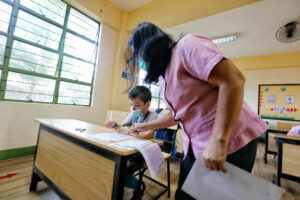COVID, the CDC, and the CHED’s continuing discrimination against the unvaccinated

The big news about the US Center for Disease Control’s “Summary of Guidance for Minimizing the Impact of COVID-19 on Individual Persons, Communities, and Health Care Systems,” released on Aug. 11, was actually about how subdued the reporting it got from mainstream news sources.
The CDC changes tune, media downplays it.
In sum, what the CDC now decrees is that:
• Those exposed to COVID no longer need to quarantine;
• Students can stay in class even after exposure to COVID;
• There is no longer a need to give a COVID test to the asymptomatic;
• The unvaccinated and vaccinated are now subject to the same rules and guidelines.
It did get a bit of space from CNN, albeit a tad grudgingly: “The US Centers for Disease Control and Prevention says the nation should move away from restrictive measures such as quarantines and social distancing and focus on reducing severe disease from COVID-19. In new guidelines … the agency no longer recommends staying at least six feet away from other people to reduce the risk of exposure — a shift from guidance that had been in place since the early days of the pandemic.”
Even then, the news media couldn’t help massaging its preferred narrative: “The shift is a sign of how much has changed since the beginning of the pandemic more than two years ago. Nearly the entire US population has at least some immunity through vaccination, previous infection or, in some cases, both. ‘The current conditions of this pandemic are very different from those of the last two years,’ Greta Massetti, who leads the Field Epidemiology and Prevention Branch at the CDC,” said.
DENIED YESTERDAY, TRUTHS TODAYThe simple fact is: nothing has changed. Doubts regarding the efficacy of mandatory vaccination, masking, distancing, and lockdowns have all been expressed from the beginning, only to be duly suppressed by medical “experts” and news media.
Experts urging a re-focus on the “Delta variant” in mid-July 2021 is illustrative of this. Stating that it reportedly causes “more severe illness than earlier variants and spreads as easily as chickenpox,” yet, even then, the admitted point was to “to persuade the public to embrace vaccination and prevention measures, including mask-wearing.” (The Washington Post, “‘The war has changed’: Internal CDC document urges new messaging, warns Delta infections likely more severe,” July 2021)
There’s, of course, monkeypox, which health officials messaged as a general public health concern even though every cogent finding shows that the disease overwhelmingly affects (almost at 98% level) a specific demographic of the population.
Indeed, data have ultimately proven the skeptics right. Japan, Australia, and New Zealand, despite high vaccination rates and oftentimes utterly restrictive COVID measures, are seeing record topping COVID cases and COVID-related deaths. US COVID cases and deaths, on the other hand, have basically taken a cyclical pattern.
And seemingly being brushed under the rug are reported cases after cases of healthy young adults suddenly dropping dead, all from heart or blood related issues, and of countries seeing this year drastically dropping birth rates.
There’s also this new Icelandic study, albeit with stated limitations, showing increased COVID reinfection rates relative to rise in vaccine doses. For most age groups, those who received two doses or more were likelier to be reinfected than those unvaccinated or had only one dose. (“Rate of SARS-CoV-2 Reinfection During an Omicron Wave in Iceland,” Elias Eythorsson, et al., August 2022)
RETURN TO SANITYIf anything, the change came in the form of acceptance of alternative forms of treatment rather than relying exclusively on vaccines, the lessening of COVID’s severity (as was predicted would happen whenever a disease mutates into newer strains), and — most gratifyingly — a begrudging recognition of the role of natural immunity. This even the CDC had to admit:
“High levels of immunity and availability of effective COVID-19 prevention and management tools have reduced the risk for medically significant illness and death.”
And, as mentioned above, the CDC’s new guidelines finally declared that its “prevention recommendations no longer differentiate based on a person’s vaccination status because breakthrough infections occur, though they are generally mild, and persons who have had COVID-19 but are not vaccinated have some degree of protection against severe illness from their previous infection.” (Boldface supplied.)
GET KIDS BACK TO SCHOOL, VACCINATED OR UNVACCINATEDHowever, it is with regard to schools that the CDC’s new guidelines find utter significance. As The Guardian elucidates: “The CDC recommendations apply to everyone in the US, but the changes could be particularly important for schools, which resume classes this month in many parts of the country.
“Perhaps the biggest education-related change is the end of the recommendation that schools do routine daily testing, although that practice can be reinstated in certain situations during a surge in infections, officials said.
“The CDC also dropped a ‘test-to-stay’ recommendation, which said students exposed to COVID-19 could regularly test instead of quarantining at home to keep attending school. With no quarantine recommendation, the testing option disappeared too.
“Masks continue to be recommended only in areas where community transmission is deemed high, or if a person is considered at high risk of severe illness.” (“CDC ends social distancing and contact quarantining COVID recommendations,” The Guardian, Aug. 11, 2022)
All the foregoing makes the intransigence of the Commission on Higher Education (CHED) and the Department of Health (DoH) even more bizarre. Ignoring Vice-President/Department of Education Secretary Sara Duterte’s indisputably correct call to remove any discriminatory treatment between the vaccinated and unvaccinated, the CHED-DoH Joint Memorandum Circular No. 2021-04 (issued December 2021) still demands that “only fully vaccinated teaching and non-teaching personnel” and “only fully vaccinated students” shall “be allowed to join limited face-to-face classes,” while the Supplemental Guidelines issued by the CHED Regional Director (March 2022) allows only the vaccinated inside school premises and that the “unvaccinated or partially unvaccinated shall continue under flexible learning modalities.”
The Joint Memorandum eccentrically relies on RA 7722 (which makes no mention of mandatory vaccination) and the IATF (which is not authorized to demand mandatory vaccination). Invariably, the Joint Memorandum goes against RA 11525 (“COVID-19 Vaccination Program Act of 2021”), which makes it clear that COVID vaccination cannot be made a requirement for government or business transactions and even points out that vaccinated individuals shall “not be considered immune from COVID-19.”
A NEED FOR ACCOUNTABILITYAs it stands, because of this continued refusal to recognize the rights of unvaccinated students, faculty, and non-teaching personnel, then (as provided for under RA 11525) they or on behalf of any person “inoculated through the COVID-19 Vaccination Program” may want to seek compensation for any “severe adverse effects” arising from the said COVID vaccination, including “death, permanent disability or hospital confinement.” The law itself set aside P500 million for this purpose.
Furthermore, it is not true (as is widely reported in media) that “public officials and employees, contractors, manufacturers, volunteers, and representatives of duly authorized private entities” are absolutely immune from suit in relation to the “administration or use of a COVID-19 vaccine.” RA 11525 actually provides that they can be sued and held liable if they acted with “willful misconduct and gross negligence.” Unreasonably demanding vaccination knowing that such goes against the Constitution and an actual act of Congress should constitute “willful misconduct.”
On top of that, public or private officials, individuals, or entities can also be sued for damages for violation of the Civil Code and other special laws, particularly those that protect constitutional rights (e.g., right to education, privacy, employment, contract) or by causing injury to a person’s reputation or health through negligence, misconduct, or bad faith.
Accordingly, anyone (or family members) that had their rights violated or suffered serious adverse effects arising from COVID vaccination are strongly encouraged to document their experiences. And as allowed by law, claim compensation under RA 11525, as well as sue for damages those that forced anyone into taking vaccines.
Jemy Gatdula is a senior fellow of the Philippine Council for Foreign Relations and a Philippine Judicial Academy law lecturer for constitutional philosophy and jurisprudence
Twitter @jemygatdula




